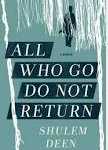 The Hasidic rabbis who decide what behavior is acceptable for their followers use the Hebrew acronym BYKL – in the Bible a warning to those who visit women of loose morals – to describe heretical ideas. In English translation, it is the source of the title Shulem Deen has given to his fascinating and deeply moving memoir.
The Hasidic rabbis who decide what behavior is acceptable for their followers use the Hebrew acronym BYKL – in the Bible a warning to those who visit women of loose morals – to describe heretical ideas. In English translation, it is the source of the title Shulem Deen has given to his fascinating and deeply moving memoir.
Deen was brought up in a Hasidic household; his parents, former hippies, were Hasidic by choice. They were Satmars, followers of one dynasty; when it came time for Deen to choose a yeshiva he entered one run by Skvers, viewing it as a less demanding alternative. Deen followed the rabbis’ precepts, studied the Torah and the Talmud, and lived a life insulated from many modern influences. When the time came – he was almost 19 – Deen married, and soon he and his wife Gitty had five children, a family small only by Hasidic standards.
But at some point Deen began to ask questions, and questions were discouraged. Deen himself remarks that there was “no moment, no solid line across time to which I could point and say: ‘That’s when I became a non-believer.’” Perhaps it was when he found that he couldn’t support a family of seven without a job, and that when he found a job he was paid in scrip, under the table, so he and his wife could continue receiving food stamps. Or perhaps it was earlier, when a teacher found him reading an English book. It was a life of Rabbi Akiva, one of the great sages, but Deen knew, or intuited, that the teacher who scolded him couldn’t read English. After all, as the Chasam Sofer had said, “All that is new is forbidden by the Torah.”
Deen continued seeking, and reading, going his way first to the local public library, where he found, in the children’s section, the World Book encyclopedia.
For the next three hours, I sat on a tiny orange chair at a low green-and-yellow table as the pile of volumes grew beside me. Alongside a little boy paging furiously through The Berenstain Bears, I read about Archimedes and Einstein, about Elvis Presley and Egyptian hieroglyphics, about electromagnetism and the history of the printing press and the production of avocados in central Mexico. . . the experience at the time was intoxicating. Suddenly, it seemed as if all my curiosity about the world could be satisfied in that little children’s section of the library.
Later, he bought a computer and installed the AOL disk that came with it. Logging on to the Internet, he found his way to chat rooms where he met other, similar seekers, and kept asking questions. He listened to the (forbidden) radio, and finally added the most intrusive instrument of all, a television.
But it was books and the knowledge he found in them that proved most troubling to Deen. He learned that the “truths” he had been taught, the teachings of the rabbis, were “dubious,” the sages of the Talmud “demonstrably wrong in their understanding of the natural world.” Deen writes:
Nothing, however, had a more shattering impact on my faith than the realization that, stripped of religious exegesis, our primary religious text, the Hebrew Bible, had the markings of human rather than divine authorship; it was beautiful, intricate, layered in poetry and metaphor and heart-stopping drama, but human nonetheless.
Eventually, he was expelled from the community as a heretic.
Deen’s journey out was a lonely one; his wife, Gitty could not or would not join him, though she stuck with him through the first expulsion, from the Skverer community of New Square to the faintly more open community of Monsey. Deen and his wife divorced, amicably, with an agreement that he would share custody of the children without disrupting their religious lives. He tried, with some failures, enough for the community to intervene. Relations turned hostile, and Deen’s children were discouraged from contact. (Deen begins his afterward acknowledging that he’s told his version of his family’s story and his ex-wife’s story is likely to be as compelling, and perhaps very different. It’s a generous sentiment.) After a year of floundering Deen found a community with other OTD (off the Derekh) men and women, through the group Footsteps.
“All Who Go Do Not Return” is a beautifully written memoir of a spiritual journey out of a faith and into a full and humanistic understanding of the world, insightful and worth reading for anyone interested in community or spirituality, as well as readers interested in Judaism or the curious continuing existence of 18th century religious traditions.
Have a book you want me to know about? Email me at asbowie@gmail.com. Follow me on Twitter @abowie917.
